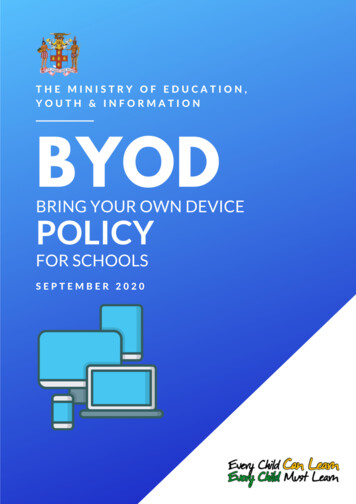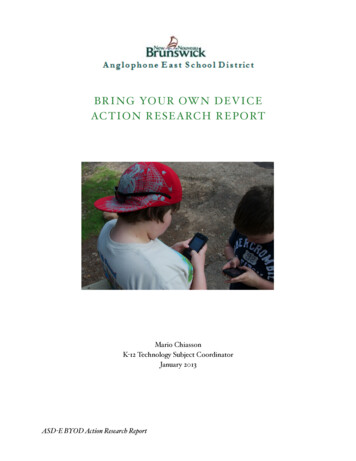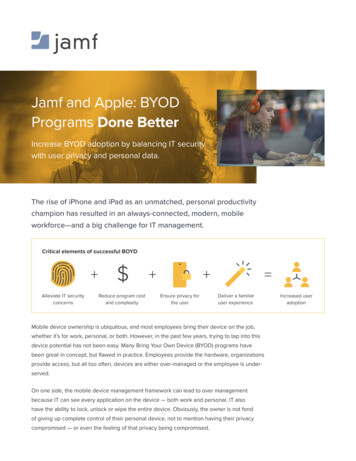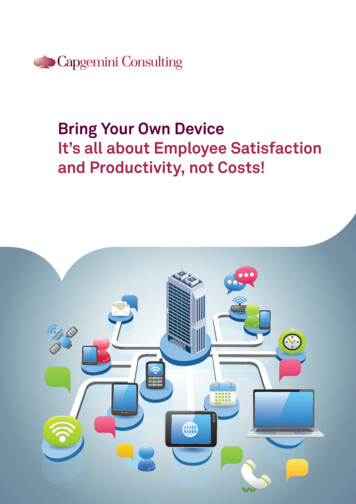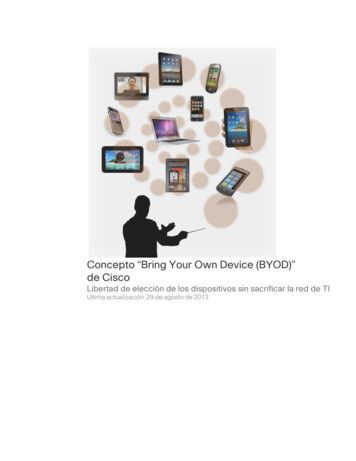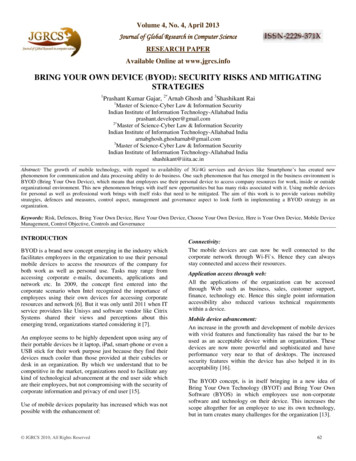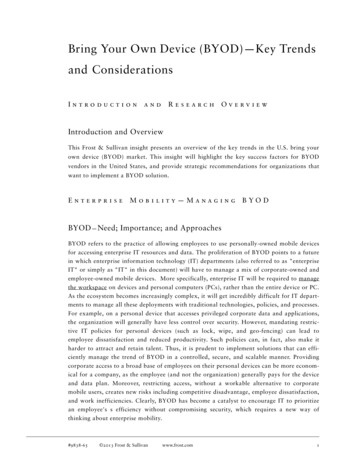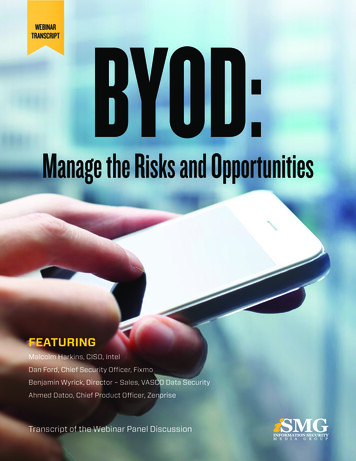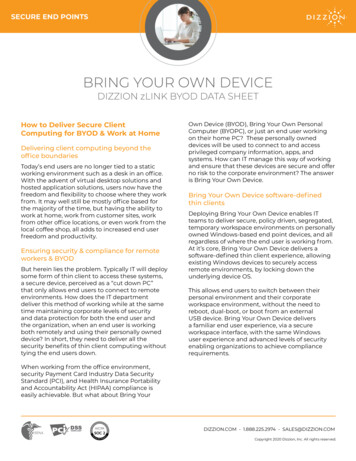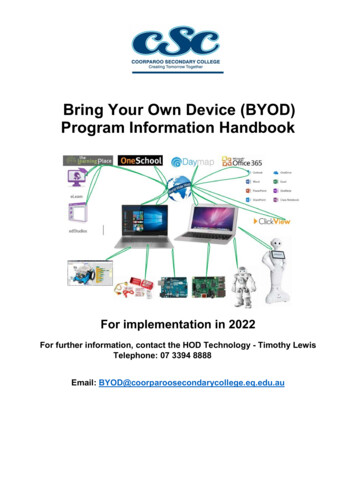
Transcription
Bring Your Own Device (BYOD)Program Information HandbookFor implementation in 2022For further information, contact the HOD Technology - Timothy LewisTelephone: 07 3394 8888Email: BYOD@coorparoosecondarycollege.eq.edu.au
TABLE OF CONTENTSOverview of the Coorparoo Secondary College BYOD Program . Error! Bookmark not defined.What does my student need to bring to school each day? . 3Why laptops? . 3Laptop Minimum Specifications . 4What if my student wants to run specialist software that requires higher specifications? . 4Other required items:. 4Required software: . 5Other recommended items: . 5Software Licencing for BYOD laptops:. 5Other recommended software: . 5Other software to consider – Apple BYOD laptops only: . 5Purchasing Considerations – “Total Costs of Ownership” . 6Vendor Information, Portals and Online Stores. 6BYOD Program Costs . 6Financial Hardship Arrangements – College BYOD Equity Program . 7Daily Borrowing Program. 7Laptop Connectivity . 7Laptop Charging . 8Technical Support . 8Teaching and Learning . 9Acceptable BYOD laptop use . 9Passwords . 10Digital Citizenship . 10Cybersafety . 11Web Filtering . 11Privacy and Confidentiality . 12Intellectual Property and Copyright . 12Software . 12Monitoring and Reporting . 13Misuse and Breaches of Acceptable Usage . 13Responsible use of BYOD laptops . 13Student Responsibilities: . 13Parents and Caregivers Responsibilities: . 13Other: . 14Health and Safety . 14BYOD Laptop Care . 15General Precautions. 15Protecting the Screen . 15Data Security and Back-ups . 15Learn more about digital devices . 16Further questions or feedback? . 162022 CSC BYOD Information Handbook Ver 2Page 2 of 16
Overview of the Coorparoo Secondary College BYOD ProgramThis handbook is for parents\caregivers and students to provide further information about the 2022 BYODprogram at Coorparoo Secondary College.In the pursuit of Creating Tomorrow Together, the Coorparoo Secondary College BYOD Program aims toenhance the curriculum program to improve student learning outcomes through increased access to digitaltools, learning resources and pedagogy. Individualised student learning and differentiation, andopportunities for students to further develop into responsible digital citizens with high level digital skills arealso greatly enhanced. From 2021, the BYOD Program was introduced for Year 7, 11 and 12 students. In2022, the program will include all Year levels.This booklet is subject to change. Changes will be communicated via the College Facebook page and thenewest version of this document will be available on the College website.Bring Your Own Device (BYOD) means exactly that: students bring their own digital devices to school,for the purposes of learning. So instead of using school-owned ICT, students use their own. TheBYOD concept recognises that students and their parents and caregivers would like to use the samedigital devices at school and at home.DETE BYOD Project Team (https://BYOD.eq.edu.au/Pages/default.aspx)The Department of Education, Training and Employment (DETE) recognises that 1:1 programs (i.e.one student to one device) are a critical component in an international move towards individualisedlearning, and that participation in these programs is associated with increased student and stafftechnology use, student engagement and interest levels (Bebell and O’Dwyer, 2010).BYOD has been increasing in all industry sectors and the introduction of the 1:1 initiative hasincreased the normalisation and increased use of digital technologies in education. BYOD allowsschools to progress to a more flexible and mature 1:1 program, address discontinued 1:1 federalfunding and responds to expectations of contemporary learners and the wider community (Source:Metropolitan BYOD Workshop presentation May 2014).According to national and international research, schools that migrate to a BYOD model enjoy many benefits,including: increased student motivation, confidence and engagement with learning because students are familiar withtheir devices greater autonomy in the classroom the maturing of students as digital citizens who embrace digital opportunities and responsibilities the normalising of technology use between the school and home greater opportunity for inter-school s/default.aspx - Alberta Government, 2012; Lee, Levins,Hubbard, & Freedman, 2013; Ministerial Council on Education, Employment, Training and YouthAffairs, 2008; Nielsen, 2013; Wainwright, 2013; Sweeney, & Intelligent Business Research ServicesLtd., 2012)What does my student need to bring to school each day?Students need to bring a fully charged Windows or Apple laptop that meets the minimum specifications,and other required items as listed below. All items must be named to allow easy identification of owner.Why laptops?Computers are currently the main digital tool used in teaching and learning across the College, thereforehaving laptops as the BYOD program device provides a standardised teaching and learning environment2022 CSC BYOD Information Handbook Ver 2Page 3 of 16
for staff and students. It also ensures compatibility with College owned computers in order to minimiseconnectivity, software and other issues.Laptops allow students to create and use a wide range of digital content across all curriculum areas, andare the most suitable and cost effective device to meet all curriculum requirements at this point in time. Thelaptop minimum specifications should extend the useful life of the laptop to a minimum of three years,subject to individual use.Laptop Minimum Specifications Windows OR MacBook laptop NOTE: MacBook required for students choosing to enrol in Music ExcellenceLaptop Size: minimum 11 inch size NOTE: maximum 13” recommended to avoid breakage and minimise weightOperating system: Windows 10 64 bit OR Apple OS Mojave 10.14Battery: 6-8 hour battery lifeProcessor: Intel Core i5 2.5Ghz 7th GenerationDisplay: FHD (1920x1080) – 1080p or higherGraphics: Intel UHD Graphics 620 or higher NOTE: Newest Macbooks do not come with VGA or HDMI ports – an Memory: 8GB or higherStorage: 256GB solid state hard drive (SSD) NOTE: 512GB is recommended if using a dual boot setup on an Apple adaptor must be purchased if students need to connect to data projectors or digital televisions e.g. for assessment presentationslaptop. If storing a large number of audio/video etc. files, consider purchase of a minimum 500GB external hard drive.Ports: 2 USB ports (additional recommended especially if a mouse is being used) NOTE: NewestMacbooks do not come with USB ports – an adaptor must be purchased to enable a USB to be plugged inNetwork connectivity: Dual Band AC compatible Wireless - 5GHz NOTE: laptops which only have 2.4 Ghzwireless connectivity will not connect to the Department of Education wireless networkIntegrated speakers and microphone with headphone ports and webcam (standard in laptops)What if my student wants to run specialist software that requires higher specifications?Some subjects (e.g. Technology and Design; Film and Television; Visual Arts; Music; Digital Technologies)use specialized software which requires upgraded hardware components to run efficiently on the laptop(e.g. computer aided design or CAD; image and video editing software; animation; virtual reality; musiccomposition). More information about specific software used in subjects can be obtained through eachsubject Head of Department by emailing BYOD@coorparoosecondarycollege.eq.edu.auIf your student wishes to install and use higher end software programs on their BYOD laptop, it isrecommended that the following hardware components be upgraded at the time of purchase: Processor: Intel Core i5 3.0Ghz 8th Generation minimum; i7 will give higher performance and shouldbe considered Graphics: Dedicated (built-in) Graphics Processing Unit (GPU) Memory: 16GB or higher Storage: Some project files can be very large – consider purchasing a 512GB solid state (SSD) harddrive to use while working on very large projects and/or a minimum 500GB external hard drive (acheaper option than a SSD) and can also be used to archive large projects when completedOther required items: Headphones with microphone to suit laptop Hard protective water resistant laptop case to suit laptop model. NOTE: Rubber sleeves do notprovide adequate protection for laptops. Warranty and/or accidental damage insurance could be voided if asuitable case is not used, or if laptops are placed directly into student bags without a case. The caseshould be strong enough to protect the laptop inside the student’s school bag New Macbooks only –USB adaptor2022 CSC BYOD Information Handbook Ver 2Page 4 of 16
Required software: Security software suite with anti-virus and anti-malware e.g. Nortons by Symantec, AVG, McAfee, TrendMicro, Avira NOTE: Security software may impact on the ability to connect student BYOD laptops to thestatewide Department of Education wireless network. Students need to be able to turn off security software ifrequired (local administrator permissions), else parents\carers (with username and passwords) will need tocome with the student to the Student Tech Hub in the Middle Senior Library to connect the laptop (8 amrecommended). Microsoft Family and Qustodio (MacOS) do not allow students to connect their BYODlaptops and should not be installed.Office 2016 or later version (free for state school students)Internet browser NOTE: Microsoft Edge is the default Windows 10 browser; Safari is the default MacOSbrowser. Students should also install Google Chrome and Mozilla Firefox as alternative browsers asdifferent sites work better with different browsersGraphmatica (Mathematics)Other recommended items: Mouse (USB or wireless)3 year warranty with next day on-site support. NOTE: Parents/carers should investigate Australian Consumer Lawprior to purchasing additional warranty and seek clarification from vendors what repairs and/or replacements would be coveredunder this law guarantees/warranties3 year Accidental Damage insuranceNew Macbooks only – VGA and HDMI adaptor to enable connection to data projectors, digitaltelevisions etc.Backup up storage device e.g. USB or external drive (size depends on amount and size of files)Extra charge cable with power packSoftware Licencing for BYOD laptops:School owned software may only be installed on school owned devices. Some subjects require the use ofsubject specific software, all of which have different licencing arrangements for private purchase and\orBYOD laptops. Where student licences are available for software or digital textbooks, licencingarrangements are managed by the relevant Head of Department. If licencing does not allow installation ofspecialist software on student BYOD laptops, students will be able to access school owned computers ifrequired for particular subjects.Other recommended software:Software used in each subject and year level is generally given to students by teachers at the start of eachschool year, semester and/or unit of work. If this information is required prior to purchasing a new laptop,contact the relevant faculty Head of Department by emailingBYOD@coorparoosecondarycollege.eq.edu.au. Note that upgraded specifications may be required forsome individual programs - see “What if my student wants to run specialist software that requireshigher specifications?” above for more information. Adobe Creative Cloud software Other subject specialist software as advised by Head of Department.Other software to consider – Apple BYOD laptops only:Consider purchasing a Windows 10 licence to enable the Apple laptop to also run Windows software;MacBook vendors should be able to provide this service for a reasonable charge if assistance if needed.Contact licensing@data3.com.au to enquire about student licencing arrangements for Windows 10 orpurchase the through a Windows reseller.2022 CSC BYOD Information Handbook Ver 2Page 5 of 16
Purchasing Considerations – “Total Costs of Ownership”A wide range of computer vendors and laptop makes and models should be investigated, and the “total costof ownership” considered when purchasing laptops.The cheapest laptop to buy may not be the most economical over the life of the laptop (usuallyminimum 3 years depending on individual use). Consider included components, technical support, warrantyand accidental damage arrangements. Upgraded laptop specifications will generally provide betterperformance over a longer period of time, depending on individual usage.The College takes no responsibility for private laptop purchases and/or finance arrangements. All issueswith laptop purchases or technical issues need to be taken up with the vendor. Deliveries must not bemade to the College.Vendor Information, Portals and Online StoresA number of vendor website portals\online stores links are provided as a service to parents/carers. TheCollege takes no responsibility for any of the information provided on the vendor portals. Vendors areprovided information about the College BYOD program, including minimum specifications and requireditems, and vendors have sole responsibility for the offerings they include on their portals. Parents/carersneed to ensure that minimum specifications and requirements for the BYOD program are met whenconsidering purchasing items through any vendor.Education vendors have experience in supplying laptops that have been evaluated for use with schoolstudents, and may be able to provide a cost effective suitable BYOD laptop, warranty and technical supportarrangements.Information about local retailers who have contacted the College about the BYOD program are alsoincluded in the list of vendors on the website.Many vendors have finance plans (including interest free options), hiring and\or leasing options availablewhich allows costs to be spread over a period of time. Purchase, finance and lease agreements are privatearrangements between the parent\caregiver and the vendor.The College takes no responsibility for any BYOD laptop purchasing and\or financial arrangements.All issues with laptop purchases or technical issues need to be taken up with the vendor, not the College.Deliveries must not be made to the College.See ulum/bring-your-own-device for more detailedinformation, and links to vendor information and portals\online stores.2022 CSC BYOD Information Handbook Ver 2Page 6 of 16
BYOD Program CostsAll BYOD charges (including Equity Program and daily borrowings) are included in the annual ICT charge inthe College Student Resource Scheme, and there are no additional charges payable to the College. Theannual ICT charge contributes towards additional connectivity infrastructure, technical support andlicencing costs to support the BYOD program.Financial Hardship Arrangements – College BYOD Equity ProgramFor families experiencing financial hardship, a limited number of College owned laptops are available forborrowing from the Student Laptop Hub in the Library each day on a first in basis.Applications for participation in the College Equity Program are through the Principal at the start of eachyear. Information and application forms are distributed at the start of Term 1 each year, and then madeavailable on the College website.Daily Borrowing ProgramIf students have an issue with their BYOD laptop on a particular day, a limited number of College ownedlaptops are available for daily borrowing each day on a first in basis through the Discovery Centre (Library).Students needing to borrow a "daily borrowing" laptop can do so from the Discovery Centre at the front counter ofthe Discovery Centre between 8 am and 8:45 am.These laptops must not be taken home, and must be returned after the end of the student's final lesson eachday. Information about daily borrowings is communicated to students through daily notices at the start ofTerm 1. The daily borrowings program usually commences in Week 2 of Term 1.Laptop ConnectivityStudent BYOD laptops connect to the College wireless network (part of the state-wide Department ofEducation network) through a Department of Education approved technical solution, BYOD Connect, toensure security requirements are met.The following information (subject to change) provides an overview of procedures for on boarding BYODlaptops: CSC needs more detail about this process: Information re timelines and procedures for connecting new BYOD laptops is provided to students through classteachers and daily noticesStudents require their username and password in order to on-board their BYOD laptop:o Existing students – passwords will be reset prior to the commencement of Term 1, with informationcommunicated to parents/carersNew students after the password reset – obtain username and password from classroom teacher or DiscoveryCentre (Library). Note it can take minimum 1-2 days from official start date for an new network account to beautomatically generated, and more during peak timesStudents must have local administrator rights to onboard their BYOD laptopDuring Week 1 in Term 1, onboarding and technical assistance takes place at allocated times for each year levelto balance out the load on the network and the computer technician.1. students attempt to onboard their laptop following instructions (Apple and Windows versions; PDF and videoguides) provided by email (accessed at home) and class teachers2. students with issues onboarding individually seek assistance from computer technician based in the DiscoveryCentre (Library). From Week 2, students still having issues can go to the technician based in the Discovery Centre (Library).Library to get assistance with onboarding, software and printing issues at the following times, or other timescommunicated through daily notices:o 8-8.45 am before school o during morning tea and lunch breaks o after school until 3.30 pmo From Week 3, students who have not had their issues resolved by can escalate ongoing issues to the HODTechnology tlewi29@eq.edu.au .2022 CSC BYOD Information Handbook Ver 2Page 7 of 16
Known issues: Security software installed on the BYOD laptop may not allow the laptop to be connected to the Collegewireless network, so students need to be able to turn off security software if required (local administratorpermissions). Alternatively, parents\carers (with security software username and passwords) will need tocome with the student to the the Discovery Centre (Library) to connect the laptop (8 am recommended)from Week 2 Microsoft Family and Qustodio (MacOS) do not allow students to connect their BYOD laptops to thewireless network and should not be installed.Once connected to the College wireless network through BYOD Connect, students are able to use theirBYOD laptop to access: Department of Education (filtered) Managed Internet Services, including online email, Office 365applications, OneDrive etc., and other websites the College network for o file management and storage, including student network H: drive and studentcommon driveoprinting services using BYOD tap and release systemParents\caregivers should be aware that BYOD laptops (as with personal mobile phones and tablets)enable access to home and other out of school networks and internet services that may not be secure orinclude filtering. The College takes no responsibility for security issues or content accessed by studentsusing private networks or other internet services on private devices, including BYOD laptops, at any time.Laptop ChargingIt is an individual student responsibility to ensure their BYOD laptops are brought to school fully chargedand ready for use each day.There is very limited capacity to charge BYOD laptops at school. This is primarily due to workplacehealth and safety issues, including: power cables are a trip hazard power cables must be “tested and tagged” to be deemed safe under Department of EducationrequirementsIn addition to this, having a large number of BYOD laptops being charged by students each day wouldsignificantly increase College electricity expenditure each year and negatively impact the annual Collegebudget and teaching and learning and other programs and available resources.Students must not plug in BYOD laptops to charge without teacher permission, and must ensure that anycharging laptops are placed in a safe location and cables do not create a trip hazard.Technical SupportCollege ICT technicians provide technical support for connectivity of BYOD laptops to the College wirelessnetwork at the Computer technicians office which is located in the Discovery Centre (Library).Every attempt will be made to connect BYOD laptops that meet the minimum specifications, assumingthere are no technical or other issues outside of tech control.All other technical issues will be the responsibility of the parent\caregiver and student, and the relevantvendor the laptop was purchased through. Vendor and technical support turnaround times should beconsidered when purchasing and seeking repairs for BYOD laptops.2022 CSC BYOD Information Handbook Ver 2Page 8 of 16
Parents andCaregiversStudentsSchoolConnection: Hardware:Software: (home-provided internet connection) school provided internetconnectionBYOD laptopvendorTeaching and Learningx(some school-based softwarearrangements) (see specifics of warranty onpurchase)Teaching and learning continues to transform with increased individual access to digital devices bystudents, and how this occurs is different in each year level and subject. Through use of digital content,concepts can generally be taught faster and with a higher level of individualization, and students can bemore productive in learning time.Each student has access to eLearning spaces and tools to support and enhance their learning andassessment, including the following tools: Blackboard Virtual classroom via https://elearn.eq.edu.au/ (email link received on enrolment) Class Notebooks via https://portal.office.com/ (email link received on enrolment) Learning Place EdStudio accessed through https://students.learningplace.eq.edu.au/ (access codeprovided by teacher or search Learning Place)Other resources are also accessed through the Learning Place and other web-based systems. TheCollege Online Services Risk Review Register provides information about third party websites, web-basedsystems, apps and tools that students use as part of their learning program that require student personaldetails (i.e. students can be identified).Further information and queries about teaching and learning using BYOD laptops in different year levelsand subjects can be obtained by contacting the relevant Heads of Departments table BYOD laptop useUpon enrolment in a Queensland Government school, parental or caregiver permission is sought to givethe student(s) access to the internet, based upon the policy contained within the Acceptable Use of theDepartment’s Information, Communication and Technology (ICT) Network and Systems. A current versionof the CSC Student ICT Network Access and Usage Policy and Agreement is included on the Collegewebsite, and must be completed and signed on enrolment, and again during the school year if required.This policy also forms part of this BYOD Program Information Handbook. The acceptable-use conditionsapply to the use of the BYOD laptop and internet both on and off the school grounds.Communication through internet and online communication services must also comply with thedepartment’s Code of School Behaviour and the Responsible Behaviour Plan available on the schoolwebsite. Policy documents can be found on the College website atStudents must only use their BYOD laptop and the College wireless network for educational purposes whileat school, and to complete tasks as directed by the classroom or supervising teacher or staff member.While on the school network, students should not: create, participate in or circulate content or activities that attempt to undermine, hack into and/or bypass thehardware and/or software security mechanisms that are in place disable settings for virus protection, spam and/or internet filtering that have been applied as part of the schooland departmental standard2022 CSC BYOD Information Handbook Ver 2Page 9 of 16
use unauthorised programs and intentionally download unauthorised or illegal (including copyright) software,graphics or musicintentionally damage or disable computers, computer systems, school or government networksuse the BYOD laptop for unauthorised commercial activities, political lobbying, online gambling or anyunlawful purposeNOTE: Students’ use of internet and online communication services may be audited at the request ofappropriate authorities for investigative purposes surrounding inappropriate use.PasswordsAccess to the College and state-wide Department of Education network and online services is secured witha username and password for each user.The password must be difficult enough so as not to be guessed by other users and is to be kept private bythe student and not divulged to other individuals (e.g. a student sh
Security software suite with anti-virus and anti-malware e.g. Nortons by Symantec, AVG, McAfee, Trend Micro, Avira . NOTE: Security software may impact on the ability to connect student BYOD laptops to the statewide Department of Education wireless network. Students need to be able to turn off security software if
